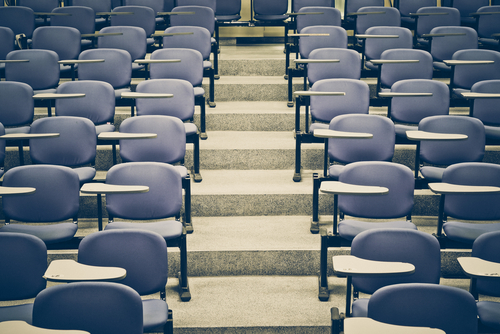If law schools can’t offer in-person classes this fall, what will they do instead?

Image from Shutterstock.com.
Students may not feel safe attending courses because of the COVID-19 pandemic, and that’s also true for professors, say law school deans, many of whom want in-person classes this fall but are making various plans they hope meet ABA accreditation standards.
A spike in the virus is another concern, one that restricts planning very far ahead. Some deans predict law schools will have hybrid courses in the fall, with both in-person and remote class time.
“We have to do what is best for the health of our students and faculty, and I am sure that in the pandemic, regulatory bodies will be reasonable about this,” says Erwin Chemerinsky, the dean of University of California at Berkeley School of Law.
Other deans are less confident and wonder if they will need accommodations for the ABA’s distance education standard.
Under ABA Standard 306, law schools can offer up to one-third of their credits online, 10 of which can be for first-year classes. In February, the ABA’s Section of Legal Education and Admissions to the Bar published a guidance memo, which stated distance learning could be a good solution for emergency situations where law school facilities are unavailable or something makes it hard for students to get to the campus. But the memo cautioned that schools and students may not have the technology necessary for distance learning, and faculty could be inexperienced with that type of teaching.
Barry Currier, the ABA’s managing director emeritus of accreditation and legal education, told the ABA Journal in March that law schools had shared their COVID-19 emergency remote learning plans with the Section of Legal Education and Admissions to the Bar. The schools wanted to adjust their education plans while preserving academic integrity, he said, and it’s the council of the section’s role to make sure the schools didn’t go too far.
 Craig Boise, the dean of New York’s Syracuse University College of Law.
Craig Boise, the dean of New York’s Syracuse University College of Law.
The February memo was published as general guidance and does not cover a specific time period. However, some deans question if the writing will extend through the fall, says Craig Boise, the dean of New York’s Syracuse University College of Law.
Since 2018, his law school has had a variance that allows a small group of students to obtain J.D.s through an online program, which includes some in-person courses. For its traditional J.D., Boise would like to have a full residential program in place by the fall, but he adds that the law school could be subject to potential state laws limiting the number of students in classrooms or how many people can be in a building at one time.
One way to reduce the total number of people in the law school could be to have all first-year courses in person and remote options for other classes.
“It’s very likely we’ll end up with some sort of hybrid model with some form of social distancing in a residential program. The very nature of a university is the opposite of social distancing, and how you lower the risks associated with the coronavirus and still allow for some interaction is not clear,” Boise says.
Considering the pandemic, schools want to give students choices about attending classes in person or remotely. But Boise says even if only one person attends a course remotely and everyone else goes to the actual class, it would be considered online for traditional accreditation purposes.
Professors are concerned about the safety of returning to in-person classes, too, and there’s a question of whether streaming in to teach students gathered in person would be considered distance learning under the ABA standard.
“My understanding is that it would still be considered distance learning when we have faculty separated from students,” says D. Gordon Smith, the dean at J. Reuben Clark Law School at Brigham Young University.
He thinks there is not enough time for the council to revise Standard 306 between now and the fall term. If fall courses need to all be online as they were for the spring, Smith says, law schools will likely need an accommodation from the current version of Standard 306.
There is a potential revision pending to delete Standard 306 and fold it into Standard 105, which deals with substantive changes in programs. Bill Adams, the managing director of ABA accreditation and legal education, told the ABA Journal that the proposed revision is not pursuant to the pandemic.
“It is a change in the review process alone, and the substantive change process is more appropriate under our standards. It will not change the limits on distance education nor make it easier or more difficult to obtain,” he wrote in a statement.
The proposed revision will be discussed in the open session of the council’s May 15 meeting, which will be held remotely.
The U.S. Department of Education, which relies on the council as its law school accreditor, wants assurances that schools meet distance education guidelines requiring regular and substantive interactions between students and instructors, says Clare McCann, who was a senior policy advisor with the department during the Obama administration.
If schools don’t meet the distance education guidelines, she adds, the department considers the offerings correspondence programs, which have many more student aid restrictions.
“There’s a significant risk with law schools—and with all schools—that the quality of online learning might be worse, especially with institutions that are going online for the first time. The faculty doesn’t have much training, and the students don’t have as many resources. The primary concern is how will students get the education they are paying for,” says McCann, now a deputy director for federal higher education policy with New America, a political think tank.
Ellen Murphy, the associate dean of strategic initiatives at North Carolina’s Wake Forest School of Law, is also an instructional designer in teaching online. According to her, teaching and learning during the coronavirus pandemic has been difficult at law schools that don’t have existing online programs.
“This is crisis remote teaching and learning. This is not online learning,” Murphy says. “I think what the pandemic has done is make us recognize that we have to be more nimble and flexible. Really good things can come from being more nimble and flexible.”
Murphy also says she hopes law schools will provide mandatory online training about teaching remotely this summer.
“There was a perception before this that online learning could only be one thing, and it was inherently limited. Professors are figuring out that it’s not limited. I’ve seen professors become more open-minded, but I think training is key,” Murphy says.



